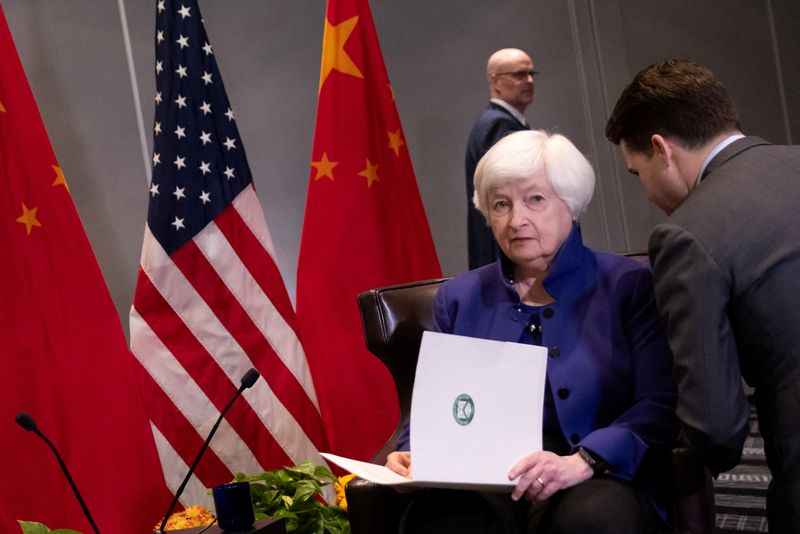By David Lawder
WASHINGTON (Reuters) -U.S. Treasury Secretary Janet Yellen will return to China this week to continue her economic dialogue with top Chinese officials amid a new emphasis on the threat to global economies from the Asian superpower's growing excess industrial capacity, the Treasury Department said on Tuesday.
The April 3-9 trip, which will be Yellen's second in-person visit to China as Treasury Secretary, will include a stop in the southern factory and export hub of Guangzhou before Beijing. She visited Beijing in July 2023 to re-establish ties after years of frosty relations.
Her trip was announced as U.S. President Joe Biden and Chinese President Xi Jinping on Tuesday held their first direct talks since November in which Taiwan tensions and U.S. national security curbs on the sale of high-technology goods to China took center stage.
Xi warned Biden that the U.S. was "creating risks" by suppressing China's trade and technology development, Xinhua news agency quoted the Chinese leader as saying.
Yellen's dialogues with top Chinese officials have been partly aimed at trying to ease tensions over China-related security restrictions, with explanations that they are narrowly targeted and not aimed at de-coupling the world's two largest economies.
In Guangzhou, Yellen will meet with her main counterpart, Chinese Vice Premier He Lifeng, Guangdong Province Governor Wang Weizhong and executives of U.S. companies in China, the Treasury Department said. She will hear first-hand about business climate challenges that are prompting U.S. firms to limit their investment in China.
Yellen last met with He in November 2023, ahead of the Asia-Pacific Economic Cooperation Summit in San Francisco, where Biden also met with Xi.
Since Yellen's first visit to Beijing last July, she and He have launched economic and financial working groups that meet virtually. Discussions so far have largely focused on economic issues facing each country and their policy responses, such as China's property market troubles that have undermined consumer confidence, or failures of two major U.S. regional banks last year.
CAPACITY CHALLENGE
The increased U.S. emphasis on Chinese excess capacity represents a shift in the discussions. China's exports have been growing at a time of weak domestic demand. Xi has pledged to unleash "new productive forces" in China by investing in developing technology industries including electric vehicles (EVs), new materials, commercial spaceflight and life sciences.
Yellen said last week at a Suniva solar module factory near Atlanta that Chinese government support has led to "substantial overinvestment" in steel, aluminum and other industries, paving the way for cheap exports that have forced manufacturing to contract in other market-driven countries.
"Now, we see excess capacity building in 'new' industries like solar, EVs, and lithium-ion batteries," Yellen said during her trip last week, adding this was distorting prices and production patterns and hurting workers in the U.S., European Union and other economies.
Asked if she would raise the threat of new trade barriers on her next China visit, Yellen said she did not want to "get into retaliation," adding: "We want to see what we can do that's constructive."
The EU is investigating whether China's EV industry is benefiting from unfair subsidies, a probe that could lead to tariffs to protect European carmakers. The U.S. Commerce Department has opened a probe into whether Chinese vehicles pose national security threats due to the data they transmit, and U.S. lawmakers have urged Biden to hike tariffs on Chinese EVs.
A U.S. Treasury official told reporters that Yellen during her upcoming China trip would "make clear the global economic consequences of Chinese industrial overcapacity undercutting manufacturers in the U.S. and firms around the world."

The official, speaking on condition of anonymity, said U.S. and Chinese officials would likely discuss currency matters as a routine part of their economic talks, but declined to comment on recent weakness in China's yuan currency.
The official added that Yellen would seek further cooperation in areas mutually beneficial to both countries, including fighting climate change, combating illicit financing and narcotics trafficking and providing relief to debt-distressed developing countries.